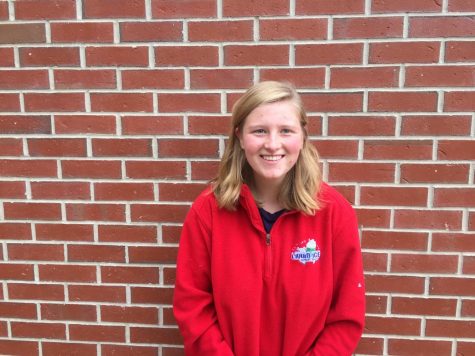Sophomore Iva* (*names have been changed to maintain anonymity) is one of the 15 percent of Algonquin students who have been sexually assaulted in some way, according to a Harbinger survey of 236 students from February 1 to February 27 through Google Forms.
Sexual assault includes any unwanted sexual contact or threats. Iva believes that in order to prevent sexual harassment and assault, formal sexual education is necessary. However, not everyone agrees with her.
“There was this guy [at lunch] that was very vigorously saying, ‘We don’t need sex ed, we don’t need any of that, that should be taught at home, it’s not right for the school to be teaching it,’” Iva said.
Iva was quick to argue that teaching sexual education and the importance of consent “is really important because some kids are taught rape culture.”
According to the National Sexual Violence Resource Center, one in three women and one in six men in the United States experience some form of contact sexual violence in their lifetime.
“I think [sexual assault] is an issue everywhere,” health teacher Melissa Arvanigian said. “It’s definitely all around us.”
Consent
Sexual consent is an agreement between two people participating in a sexual activity, according to school adjustment counselor Sarah McNulty.
“I worry there is still a gap in what consent means,” McNulty said.
Senior Janette* has found herself in difficult relationships in the past.
“[Consent] is really not that difficult of a concept,” Janette said. “You ask, and you make sure that the other person is okay. It’s not hard to read the body language, where they might be saying ‘yes’ but they seem physically uncomfortable, you realize that maybe they don’t actually want to. I don’t think that people understand that [consent] can’t be a coerced or a convinced thing, because that’s not consent.”
According to The Harbinger survey, 22 percent of students say they have engaged in a sexual activity that they were uncomfortable with but did not verbalize.
“Consent isn’t just saying ‘yes’ at the beginning of an activity and then not asking throughout,” Iva said. “A lot of people just kind of assume and then things happen that you kind of wish didn’t happen.”
Furthermore, Janette believes problems arise when people think that being in a relationship implies continuous consent.
“Just because you’re in a relationship doesn’t constitute that everything is consented for all the time,” Janette said.
According to Arvanigian, being under the influence of any sort of drugs or alcohol can inhibit someone’s decision making skills and lead that person to react to a situation in a way he or she would not normally. Senior Steven Moffa agrees that this uncertainty can pose issues.
“Consent is obviously super important…but I still think people still have blind spots when it comes to stuff like parties, if someone’s drunk and they’re drinking or they’re smoking or something like that,” Moffa said. “There’s a point where, is it that person’s personal decision, or are they just reacting to the moment?”
Iva feels that in order to give full consent, a person must be completely sober and old enough to consent. The legal age of consent in Massachusetts is 16 years old.
“If you’re under [the influence of] alcohol, it’s not at all possible to really give consent,” Iva said. “I don’t think it’s possible to give consent if you’re like 14… I don’t think that when you’re that young you can really know what you want and what is healthy.”
Consequences of assault
Arvanigian worries that sometimes students do not have the confidence to stand up for themselves and they participate in sexual activities they are not totally comfortable with.
“That uncomfortableness you feel in your stomach, that gut feeling, that is what you should listen to because that is being true to yourself,” Arvanigian said. “And some kids, even though they know what they believe in, they’ll follow the crowd; that’s just part of high school. I’m trying to teach them that it’s okay to stand up for yourself, it’s okay to be true to yourself, because at the end of the day, and at the end of a situation, you are the one that you have to face in the mirror.”
According to Iva, when perpetrators intentionally ignore consent, the effects on the victim can be damaging.
“A lot of mental health problems and trust issues and feeling icky inside [come when people don’t respect consent],” Iva said. “It doesn’t feel good. It can create some tension or other bad feelings for someone you don’t want to have bad feelings for.”
According to the National Sexual Violence Resource Center, 20 to 25 percent of women and 15 percent of men are victims of forced sex during their time in college and nearly two thirds of college students experience sexual harassment. However, more than 90 percent of these incidents go unreported.
Police Captain and Operations Commander for Mass College of Pharmacy and Health Sciences Keith Kasprzak works on-campus in Worcester. Part of his job is responding to sexual assault and rape reportings.
“All of all our officers are certified sexual assault investigators,” Kasprzak said. “So, if it occured on-campus, for example in residential housing, we would work closely with the Worcester police department with their sexual assault investigators.”
According to Kasprzak, minors who are charged with sexual assault may be faced with serious legal consequences.
“Depending on what the crime is, it would be handled in the courts,” Kasprzak said. “It could be handled as a juvenile matter, or if it was serious enough, they could be charged as an adult.”
According to Kasprzak, in addition to legal repercussions, in many colleges, perpetrators are punished by the school as well.
“[Sexual assault perpetrators] would be removed immediately from the campus and the school would be doing whatever they could to assist the victim whether it’s counseling or if they wanted to go live in another space if they were uncomfortable,” Kasprzak said.
According to Kasprzak, a school’s Clery Report is valuable resource for students who will be choosing which college or university to attend.
“The Clery Act is a federal guideline as to what types of crimes we have to report and make an annual report available to anybody who is looking at the college,” Kasprzak said. “For example, if you had a campus that had a lot of sexual assault or dating violence, all of that has to be disclosed in the Clery Report.”
Students can find any school’s Clery Report by searching it on the internet, or by searching for it on a school’s website.
“I think anybody looking at any college should closely review the Clearly report to see what types of incidents and crimes are prominent in that area or in that campus and then make a decision based on that,” Kasprzak said. “Also see what type of crime prevention the college has. Just security, or do they have a police department? Are they scattered about the city? Do they work closely with the city police department or are they on their own? All things you have weigh into when you’re making your decision.”
Why does sexual harassment keep happening?
According to Arvanigian, the way people perceive sex can contribute to cases of sexual assault and harassment.
“Sex is power, isn’t it to some?” Arvanigian said. “You’re giving your whole self, your whole body to someone else, and I think it’s almost like someone wants to feel like they’re more in power; it’s a control thing.”
Iva noticed that many students feel proud about performing sexual acts, which she believes contributes to the problem as well.
“I think if we could get away from seeing sex as an achievement, that’s a huge societal thing that needs to be fixed,” Iva said. “When I got a boyfriend last year, all the sudden my social life on the [sports] team was much easier…It was like, ‘Oh, you’re dating someone in the grade ahead? Clearly, you are so much cooler.’ And it makes the whole freshman dating a senior thing seems cool to the freshman, and that’s kind of toxic. It opens the door to abuse from people who know a little bit more about life and sex than people who are just coming into the high school.”
Another reason sexual assault can be hard to prevent is because victims do not always feel comfortable coming forward. Iva believes there is a component of shame around being a sexual assault victim.
“There’s a girl in my class who said something like, ‘Well, if I was being raped, I would punch the person, hit the person, scream.’ I was like, ‘You’ve never been there, how do you know?’”
According to principal Dr. Sara Pragluski Walsh, in order to help victims of sexual assault at Algonquin, major societal changes must occur to make victims feel more comfortable with coming forward.
“It’s more of a national issue in that we could all do more to educate about relationship abuse and violence in order to decrease the stigma that comes with reporting this,” Walsh said.
Iva believes it is even harder for men to come forward after being sexually assaulted.
“Guys don’t get enough attention for what they have to deal with,” Iva said. “Girls have to deal with it a lot more, which is why it gets more attention, but if a guy told some people here [at school] that he had been sexually harassed, they’d probably say, ‘What? You didn’t want it?’ And I think that’s kind of part of a toxic thing here at Algonquin.”
According to Moffa, precedents in politics may set a negative tone for what people feel is acceptable in society.
“I think when your president calls someone a ‘whore’s face’ on Twitter or makes jokes about reporters having bad plastic surgery…it shifts attention from actual social issues and it makes light of the actual social issues that we have,” Moffa said. “Especially for young kids seeing that our president’s saying stuff like that, are kids going to think that that’s okay when they’re older? Are they going to think that that’s fine, because their president did that?”
President Trump has been accused of sexual assault by at least 21 women since the 1980s according to the Independent, a British newspaper.
Arvanigian believes that media as a whole can have a profound influence upon younger generations as they grow up watching their role models perpetuate forms of abuse.
“When you see big names, maybe it’s someone that you admire, and they do these things, that can also create a problem,” Arvanigian said.
Seven respondents to the anonymous Harbinger survey say they been raped, and an additional seven report being unsure if they were raped. According to the National Sexual Violence Resource Center, one in five women and one in 71 men are raped in their lifetime.
Students seeking help after being sexually assaulted or raped can call the National Sexual Assault Hotline, (800) 656-4673, which operates 24 hours every day and assists victims through emotional support, information, advice or a referral to further help.



